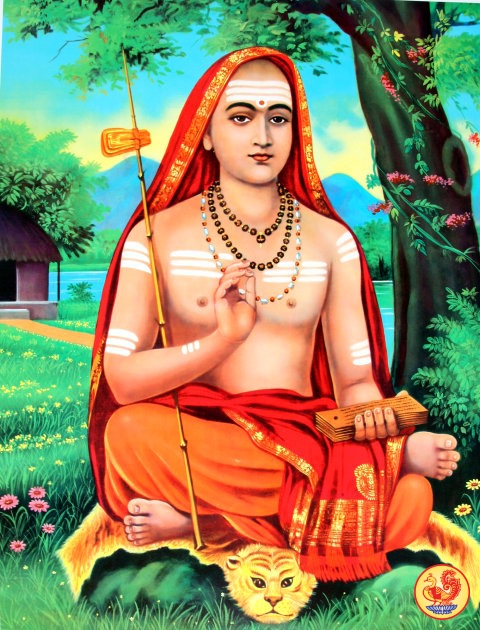Shankaracharya is one of the giants of Hindu philosophy, a thinker who had--and who still has--a profound influence on Indian thought.
Shankaracharya, or Adi Shankaracharya, was born at Kaladi, presently a village in the Ernakulam district of Kerala. One of the greatest Hindu philosophers and teachers of the post Gupta period, he travelled the length and breadth of India disputing with the Buddhists.
Shankaracharya is said to have lived from 788 – 820. During his short life span, he did much to popularize devotion of Shiva among the people of India. He composed extensive commentaries on the Brahma Sutras of Badarayans and the chief Upanishads, Bhagwat Gita and founded an order of Hindu monks to carry on his work.
For Shankara all the Vedic literature was sacrosanct and unquestionably true. He succeeded in harmonizing the paradoxes in the Vedic literature. Shankara maintained that the only reality was Brahman, the impersonal world soul of the Upanishads with which the individual soul is identical. In fact his Brahman is not really different from the void or the nirvana of the Mahayana Buddhism. Hence, he is also called a crypto Buddhist by his opponents.
The doctrine of Shankaracharya is often known as advaita (‘allowing no second’ i. e. pure monism) or kevaladvaita (strict monism).
Apart from being one of the greatest minds of the world, Shankaracharya was an able organizer. He established four famous monasteries at Sringeri (in Chikmagalur district Karnataka) Dwarka (in Jamnagar district of Gujarat), Puri in Orissa and Badrinath on the snowy heights of the Himalayas in the state of Uttrakhand.
Shankaracharya died at a comparatively early age at Kedarnath in Uttarakhand. His place in Hinduism can be compared to that of Saint Thomas Aquinas in the Roman Catholic Church.
 |
| image source: sringeri.net |
Shankaracharya is said to have lived from 788 – 820. During his short life span, he did much to popularize devotion of Shiva among the people of India. He composed extensive commentaries on the Brahma Sutras of Badarayans and the chief Upanishads, Bhagwat Gita and founded an order of Hindu monks to carry on his work.
For Shankara all the Vedic literature was sacrosanct and unquestionably true. He succeeded in harmonizing the paradoxes in the Vedic literature. Shankara maintained that the only reality was Brahman, the impersonal world soul of the Upanishads with which the individual soul is identical. In fact his Brahman is not really different from the void or the nirvana of the Mahayana Buddhism. Hence, he is also called a crypto Buddhist by his opponents.
The doctrine of Shankaracharya is often known as advaita (‘allowing no second’ i. e. pure monism) or kevaladvaita (strict monism).
Apart from being one of the greatest minds of the world, Shankaracharya was an able organizer. He established four famous monasteries at Sringeri (in Chikmagalur district Karnataka) Dwarka (in Jamnagar district of Gujarat), Puri in Orissa and Badrinath on the snowy heights of the Himalayas in the state of Uttrakhand.
Shankaracharya died at a comparatively early age at Kedarnath in Uttarakhand. His place in Hinduism can be compared to that of Saint Thomas Aquinas in the Roman Catholic Church.
Comments
Post a Comment